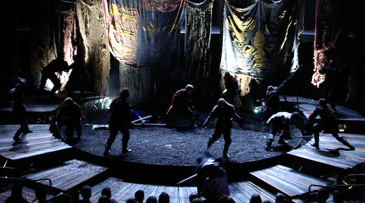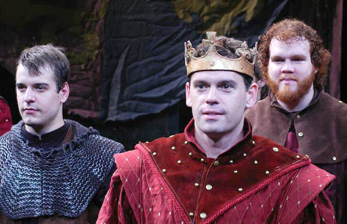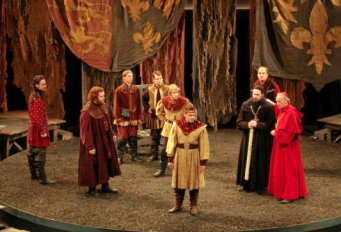Summary 
Outdoor history play, cleverly staged with jagged ramps and billowing banners that become battlefield tunnels and soldiers' tents. A strong lead performance, with Henry's speech strikingly elevated and affected. Intelligently conceived and strikingly realized political and personal irony.
Design
Directed by Alec Wild. Set by Jack Magaw. Costumes by Dottie Marshall Englis. Lights by Julie Mack. Sound by Joshua Horvath.
Cast
Eddie Collins (Henry V), Jeremy Van Meter (Exeter), Matt Daniels (Fluellen), Mark Hines (Bardolph), Ed Swidey (Nym), Christopher Oden (Pistoll), Henson Keys (Charles VI), Crystal Finn (Princess Katherine).
Analysis

In his first year as artistic director of the Illinois Shakespeare Festival, Alec Wild stages Henry V in a literal "wooden O," a gravel pit encircled by uneven wooden ramps that ingeniously transform into the jagged terrain of battlefields and the under-lit mines and tunnels at the siege of Harfleur. Tattered banners suspended from the stage walls are pulled down to cleverly become the battlefield tents for the "A Little Touch of Harry in the Night" scene, an eerie purple glow lighting the conversations between the cracks in the wooden ramps. The broken ramps evoke the hardships of the new King's efforts just as the mottled shades of brown suggest the patchwork nature of Henry's kingdom of English, Irish, Scots, and Welshmen. With three outdoor productions performed in rotating repertory, Wild's crews must deconstruct and rebuild the stages daily from Tuesday through Sunday throughout the summer. The unique stage designs set this Festival apart from less well-funded outdoor Shakespeare efforts with makeshift sound and lights and bring-your-own-lawn-chair seating.

Eddie Collins excels in the title role, his stature and demeanor channeling Kenneth Branagh, his voice strongly projected and his diction elevated and affected more than any other character. The young King seems to be thinking through decision-making situations and conflicts even as they arise. Collins's Henry commands the stage, part of the action but his character distinct, just as is his Berowne in the Festival's Love's Labour's Lost.

Wild's direction of Henry V is well focused on the historical action and makes an engaging corollary to modern political events - a world leader recklessly plunging his nation into a bloody war for vague and poorly proven reasons - that a sophisticated audience does not take for granted. Wild's dark vision is relentless and emotionally effective, the desperate negotiations at the siege of Harfleur shouted over the audience's heads to French citizens in the upper reaches at the rear of the theatre, and the Agincourt battle staged in striking images, sometimes at breakneck speed, then reined to slow-motion and even freeze-frame snapshots.
The only comic relief comes, surprisingly, not from Hal's old Boar's Head compatriots - whom without their leaders seemed tragically lost and embittered, forced to face their own impending dooms - but from the foot soldiers. On the heels of the King's "once more unto the breach" battle cry, Wild reveals the common bond of the infantry, despite their cultural and language differences: the 3.2 exchange between the Englishman Gower and the Welsh Fluellen becomes comically difficult to understand when MacMorris joins the tactical debate with his thick Irish brogue, but none of the characters - and certainly no one in the audience - can make any sense of Jamy's blustering Scottish burr. The unexpected laugh gives way to Henry's vicious threats against and ultimatum to the French citizens, a brilliant counterpoint executed by Wild.
Note: A version of this article was edited and published as a season overview in Shakespeare Bulletin, Vol.26, No.3, Fall 2008.
Photos © Pete Guither 2007